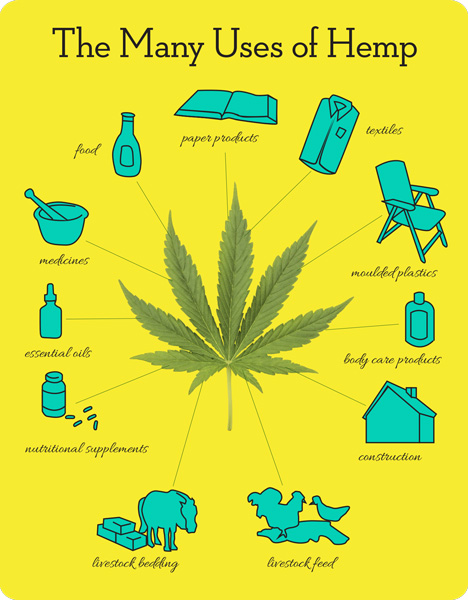Hella handy hemp

Graphic information from: http://bigthink.com/experts-corner/the-truth-about-hemp-an-interview-with-chris-conrad
April 21, 2014
The economic benefits of hemp are gaining recognition worldwide, but America is still catching up.
Hemp—a variety of the cannabis plant—is classified as a controlled substance and has long been illegal at the federal level, leaving the general population mostly unaware of its numerous applications in products such as food, paper, textiles, construction and cosmetics.
As countries such as China and Canada begin to capitalize on hemp’s economic value, the functionality of hemp products is reaching a new high. Given industrial hemp’s legality in 10 states, President Barack Obama signed the Farm Bill Feb. 7, which contains an amendment legalizing hemp production for research purposes in state agriculture departments and institutions of higher education.
The Hemp Industries Association estimated that the total U.S. retail value of imported hemp products such as textiles reached nearly $500 million in 2012, according to data from the Congressional Research Service.
“I’m not even sure if the American public knows hemp exists,” said Brian Webster, special projects union representative for the United Food and Commercial Workers Union’s Medicinal and Hemp Workers Campaign. “People who are environmentalists, people who are industrialists, people who are agriculturalists—they all know the benefits of hemp and that the hemp industry exists in Canada, in Hungary and in China.”
Anndrea Hermann, president of the Hemp Industries Association, said hemp activists are working hard to dispel misconceptions about the valuable cash crop. She said the markets for marijuana and hemp are different in terms of product applications, distribution, commercialization and handling, adding that industrial hemp cultivars can be used for paper products, textiles, plastics, body care products, construction, essential oils, medicines, nutritional supplements and even food.
“In the hemp industry, we work really hard to delineate industrial hemp from marijuana, but we’re moving into a time when state legislation is legalizing marijuana before legalizing industrial hemp,” Hermann said.
Marijuana is not the only cannabis product with a medical application. Hermann said industrial hemp can produce significant health benefits.
“If you’re in a dispensary setup and you’ve got patients coming in who are suffering from all kinds of things, sometimes providing essential fatty acids could help,” Hermann said. “So patients could purchase a bottle of hemp seed to feed the body essential fatty acids, which are required for the functionality in the body.”
Hermann said that in the U.S., hulled hemp—or shelled hemp, which is the grain without the outer shell—is available for purchase. The tiny nut that remains is called a hemp heart and can be eaten like a sunflower seed.
Webster said he wishes more people knew how long hemp has been a part of American culture and that he wants people to know about hemp’s benefits as a crop.
“Most people don’t know the constitution was printed on hemp paper,” Webster said. “They don’t know George Washington grew hemp. They don’t know Thomas Jefferson advocated its [agricultural importance], but everybody’s heard of marijuana. That’s for sure.”







